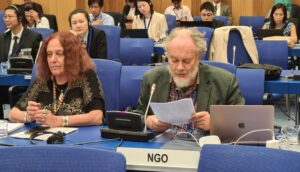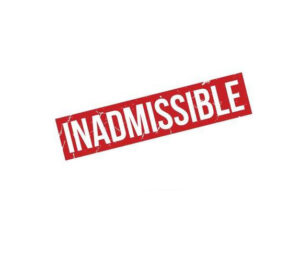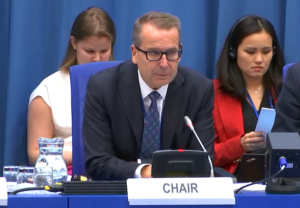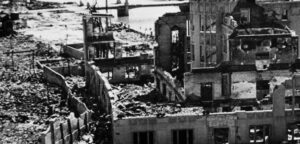Note: The Appeal to Putin and other leaders: Do NOT use nuclear weapons in the Ukraine conflict, has over 96,000 endorsements. Click here to add your endorsement.
Introduction:
Tadatoshi Akiba became Mayor of Hiroshima in 1999. As such, he also served as President of Mayors for Peace. In 2003, he addressed the second Preparatory Committee Meeting of the 7th NPT Review Conference, where he announced that Mayors for Peace aimed to launch an international movement of cities for the abolition of nuclear weapons. Thus the 2020 Vision Campaign was born, during which, while Akiba was Mayor (through 2011), the membership of Mayors for Peace expanded from less than 500 to more than 5000 cities, representing well over one billion people. He is interviewed here by Aaron Tovish, who was the International Director of the Campaign until 2015.
Some necessary background: The 2020 Vision Campaign first proposed in 2006 that the United Nations General Assembly establish an Open-Ended Working Group on Nuclear Disarmament. In 2010, the UNGA adopted the proposal. In 2015, the Working Group recommended to the UNGA that negotiations on a nuclear weapon ban treaty be convened under the auspices of the United Nations. The product of those negotiations were presented to the UNGA in 2017, which approved opening the Treaty on the Prohibition of Nuclear Weapons for signature. By 2020, 50 member states had ratified the Treaty and in 2021 it entered into force.
Now, as a former Mayor of Hiroshima, Tadatochi Akiba (TA) has again taken up the cause of the atomic bombing survivors, the Hibakusha. Aaron Tovish (AT) is now a member of NoFirstUse Global’s Steering Committee.
Interview
AT:
What inspired you to launch your change.org appeal?
TA:
Once the conflict in Ukraine started, President Putin issued at least two threats to use nuclear weapons.
First of all, it is against international law: there are several pieces that I can point out to show that it’s illegal.
One is the advisory opinion of the ICJ issued in 1996. It’s an advisory opinion. However, it does have a significant weight in thinking about the legality of international matters. The use of or the threat to use nuclear weapons is, in general, against international law. And ICJ allowed an exception, which was that the court could not make a judgment if a nation faces an existential threat.
Indeed, Russia is not facing an existential threat at this time. As a result, the exception doesn’t apply.
A second point is that the TPNW serves to fill that gap. The TPNW is a bona fide piece of international law, even though nuclear weapon states and nuclear dependent states have not ratified it.
It is an effective international law governing the behavior of nations related to nuclear weapons. And it prohibits the threat of the use of nuclear weapons.
And third, the leaders of the five nuclear weapons states, including Russia, issued a Joint Statement on January 3, explicitly stating that their weapons are not targeted at each other or other countries. And now Putin’s saying that he might use it, contradicting himself. He should live up to the statement. So should other nuclear-weapon state leaders who signed it.
His words shocked the hibakusha into indescribable fear and an unspeakable state of mind because they were brought back to August 6 or August 9, 1945. In their minds, they recalled what it is that Putin was threatening to do. And they felt obligated to do anything to stop him from using nuclear bombs.
And I feel precisely the same way.
As just one weak individual, I resorted to a mechanism of collecting signatures through the internet called change.org. The campaign aims to persuade President Putin to declare that he will not use nuclear bombs. The petition also appeals to other nuclear-weapon states to follow President Putin’s initiative by announcing that they will not use nuclear weapons.
And the campaign is getting close to 100,000 signatures, supported by people worldwide.
No hibakusha could even imagine that a responsible person would threaten the world with the possible use of nuclear weapons. President Putin crossed that line of impossibility because he has not fully understood the hibakusha’s experience in Hiroshima and Nagasaki. Anybody who has internalized the tragedy would never be able to imagine using nuclear weapons or even threatening to use nuclear weapons.
As the super nuclear-weapon state leader who decides to use nuclear weapons, I believe that he must visit Hiroshima as soon as possible before he makes that decision. All other nuclear-weapon state leaders share the same obligation.
From my experience of observing the visitors to Hiroshima for over half a century, practically everyone who visits the city, tours the A-bomb museum, listens to some hibakusha, discusses life and death with them, and interacts with the citizens reaches the same conclusion: They had never understood the horror and inhumanity of nuclear weapons until they came to Hiroshima. No nation should ever use nuclear weapons.
Suppose President Putin has no time for such a visit, in that case, Prime Minister Kishida, whose election district is precisely the area of the hypocenter and the A-Bomb Dome of Hiroshima, should step in. He is knowledgeable about the hibakusha who have already passed away and, more importantly, those still suffering and very much concerned about the present threat.
He should fly to Moscow and tell President Putin how terrible it would be to use nuclear weapons from historical facts. And he should also go to New York to attend the Security Council to do the same thing for other nuclear-weapon states leaders.
PM Kishida is legally responsible for representing the people of his election district. That includes hibakusha’s voices, its historical legacy, and the will of the electorate of his district.
I should point out that I was mayor of Hiroshima for twelve years, although I was born in Tokyo. And I was not in Hiroshima on August 6, 1945. That did not prevent me from representing Hiroshima citizens, including hibakusha, to the rest of the world because it was their will to choose me for that position. And because Kishida is the Prime Minister similarly elected by the citizens and hibakusha of Hiroshima, he has even a greater responsibility. Now he can move the Japanese national government based on the will of the citizens and hibakusha.
AT:
So, the petition is out now, and it’s zeroing in on about 100,000 supporting signatures which for Change.org is quite an impressive showing. Do you have any specific plans of what to do when it reaches 100,000?
TA:
I already sent a letter to President Putin and Prime Minister Kishida when the count was just over 50,000. So the next goal is when the count reaches 100,000; I would like to resend the letters to President Putin and Prime Minister Kishida, and the rest of the nuclear club leaders.
AT:
Well escalation could occur in a number of ways and all of the countries that have the wherewithal to do that all need to hear this message.
TA:
For anybody to change the stated position publicly requires subtle nudging. Just shouting at that person may not work. Perhaps a better way is to set up an environment in which a compromise is acceptable.
Any possibility that will point to a compromise, anything that encourages him not to use the weapon, is worth considering. What about other nuclear-weapon states proposing that “Hey, if you promise you will not use nuclear weapons, we will promise that we will not use nuclear weapons in this conflict. And let’s go a step further: let’s declare that no one will use nuclear weapons against other states unless one is attacked by a nuclear weapon.
That is “No-first-use.”
AT:
In articles in Japanese newspapers that recently reported on this petition, you have explained the relationship you see between no first use and abolition. Maybe you could take a moment to go through that from a logical point of view, but also from a political point of view.
TA:
Okay, suppose a leader of a nuclear weapon state personally and secretly wishes to eliminate nuclear weapons; therefore, their country should ratify the TPNW. But ratifying means that you will have to physically remove nuclear weapons and other related facilities. You will also have to change the industrial structure of the country. More technical details will accompany such a gigantic decision.
The TPNW State Parties Meeting will try to spell out this aspect. That step is necessary to make the treaty enforceable. At the same time, that would only make things harder for the leader who secretly wishes to get rid of nuclear weapons but is bound by the status quo.
One thing we need to do is not to make his job more difficult. We should try to make his secret wish become easier to accomplish. We should offer something that would become an incentive.
Something could be what the leader would interpret as follows: “Hey, this is easier than ratifying TPNW outright now. This step might be doable. And this step does not cost much. And this step is persuasive enough for the majority of my people to support instantly. And it will be a good stepping stone to the ratification of TPNW.”
And that’s the adoption of the no first use policy. It’s easier for several reasons. The first is that China and India have already declared no first use, and they have abided by it. Out of nine nuclear weapons states, two already agree. That’s better than the TPNW, which no nuclear weapons states have ratified yet.
And the second is that President Obama tried to make NFU an international agreement through the United Nations. Unfortunately, Prime Minister Abe destroyed the initiative by his opposition.
However, in the United States, there is a strong wave rapidly spreading supporting NFU. So, there is great hope that President Biden will buy it.
And the third is that nuclear weapons states other than China and India have agreed to the principle of no first use by ratifying nuclear-weapon-free zone treaties.
For example, the Tlatelolco Treaty that covers Latin America and the Caribbean prohibits those countries in the region from possessing nuclear weapons. And five nuclear-weapon states, the members of the permanent members of the Security Council, have agreed not to use nuclear weapons in that region.
By signing the treaty’s protocols, the five nuclear-weapon states already agreed to the no first use policy, although within a limited region. That’s a good sign.
We have accomplished partial success in making the no-first-use policy universal.
All we need to do is push a little further and make it spread to the rest of the nuclear-weapon states and the rest of the world.
Another good point about NFU is that it is easy to do. It’s just a declaration. You do not have to demolish the existing facilities or dismantle nuclear warheads and missiles.
Even if it is only a declaration, once the world sees that no first use policy works in reality by starting to trust each other just a little bit, the world will move toward evolving into a more peaceful state.
That means the nuclear weapon state leaders will feel more confident in accepting TPNW ratification and the rest of the process of abolishing nuclear weapons.
In other words, no first use is the lower stepping stone for reaching a higher goal of TPNW. That is my proposal. It may be difficult for someone to achieve a lofty goal, but one can start climbing one step first and making the next destination more attainable. This one step that these leaders can quickly go up is no first use.
AT:
One of the criticisms that has been raised against no first use is that saying no first use somehow implies that the second use is perfectly okay. How do you respond to that criticism?
TA:
If there is no first use, there is no second use. When we count numbers, we don’t start with 234. If we don’t count one, we cannot reach two — it’s as simple as that. When no one goes first, you end up not using any nuclear weapons.
AT:
Well, you have China and India, they have no first use policies. but Pakistan and the United States do not. So they could conceivably be hit with a first strike and then their hands would be free, so to speak, to retaliate. So what you’re talking about is a situation where it has become universal. How do we get from two out of the nine up to all nine while still convincing people that it’s actually in their interest to have a no first use policy when there are still some other nuclear weapons states who, as yet, do not.
TA:
What you are talking about is puzzling. What we should focus on are China and India. Although they adopted and abided by NFU for some time, no country used nuclear weapons against them. The China-India borders are often sources of tension, but the tension has decreased considerably since both countries adopted the NFU policy.
Some leaders, like President Obama, will have to initiate the move to universalize NFU. It will be ideal if the leader starts the process in consultation with all the related parties. Given the shock the world is experiencing right now, any leader who refuses to sit at the negotiating table will not be popular among their citizens.
And please remember that one of the Russian concerns was that NATO would place missiles in Ukraine. An NFU negotiation will address that concern as well.
When such a negotiation starts, the world will also question, “Who has given any country the right to use nuclear weapons first?”
AT:
In one interview, you use the numbers 2030/40. Does this reflect what you’ve just been saying?
TA:
Yes, we used to have the 2020 Vision Campaign by Mayors for Peace, which meant that we should aim at abolishing all nuclear weapons by the year 2020, with the interim goal of having a treaty on the prohibition of nuclear weapons by 2015. And now, look at what happened. The TPNW became a reality in 2017, just two years after our goal, which isn’t too bad, given that the world is complex and we were just mayors.
But, the goal of abolition of all nuclear weapons by 2020 did not become a reality. Now let us reschedule our aim of total abolition to 2040. Some people argue, “Why not 2045, which is 100 years from 1945?” I want to emphasize the difference of five years. The “five years” emphasizes that we need to prove to future generations that the abolition has resulted from massive human efforts to make the deadline even a second sooner than a natural 2045. It will be proof that we human beings have made a conscientious effort aiming at 2040, and we have accomplished it.
But again, we need to focus on the interim goal of 2030. The year 2030 would be a practical goal. First of all, we have to spread the idea of no first use to most people on earth. Not many people are aware that such a concept exists and is workable. Let’s spend the rest of this year reaching the majority of people somehow and convince them that the no-first-use policy is good, wise, and practical.
AT:
There are other proposals out there which include many steps and many measures. What we’re talking about here is basically a single intermediate step.
Obviously, there are a lot of other details that need to be worked out along the way, but there’s something special about no first use. If you’re accepting that you’re not going to use your nuclear weapons first, that means, in terms of defense, that you’re going to rely entirely on your conventional weapons and not resort to nuclear weapons. Once you take that position, then you’re basically saying, we don’t actually need our nuclear weapons, and therefore we are ready to let go of them as soon as everyone else is ready to let go of theirs. So you create a momentum for going that second step to abolition.
TA:
Yes, exactly. Also, don’t forget that adopting the no first use policy generates a new kind of atmosphere. When you reach that stage, the nation-to-nation relationship will radically change. For example, carrying around the button that launches your nuclear weapons will no longer be necessary. The nonexistence of such a device would change the thinking of the national leaders of the nuclear-weapon states. Indeed, the negotiation process of reaching no first use with each other would generate inspirational ways of communicating. You’ll start seeing different possibilities for managing the affairs of the world.
When Russia invaded Ukraine, most of us on earth felt a great shock because we were so used to thinking that diplomacy works to take care of most world affairs. A country in good standing, recognized internationally as an important actor, should all of a sudden resort to military actions?
The shock the world has shared this time represents the world’s majority opinion and feeling. And it is time that this line of thinking will spread to the leaders of all the countries.
This time, the crisis shows again that the world has reached the stage where diplomacy and negotiations resolve nationalistic differences and problems. In other words, it is time to erase war from our vocabulary.
AT:
I think one good thing about no first use is that it shifts the burden of responsibility. Deterrence is based on the idea that I won’t attack you because it won’t work not because I would regret doing it. But with no first use, I won’t attack you because that would be a horrible thing to do, no matter what the consequences were for me. So I’m going to make sure I’m not responsible for any initiation of nuclear warfare. And I hope that you all, the other nuclear-weapon states, could take on a similar responsibility so that we’re no longer supposedly saving the world by threatening its total destruction. Rather, because of our horror at the concept of imposing annihilation on the world. So it involves, as you were saying, a real shift in attitude.
TA:
Yes, no first use logically means no deterrence theory because deterrence presupposes that a nuclear weapon state uses nuclear weapons. In other words, the premise on which the deterrence theory rests is gone. Even those who worship deterrence theory will have to come to their senses.
AT:
The Nuclear Non-Proliferation Treaty is reviewed periodically, and the most recent review conference, which was supposed to be on the 75th anniversary of the Hiroshima and Nagasaki bombings and the 50th anniversary of the treaty, has been postponed now until August of this year. It will be the first time in seven years that the countries of the world come together to specifically talk about nuclear weapons.
How can all those countries the non-nuclear-weapon states impress upon the nuclear-weapon states that this mutual threat and readiness to use nuclear weapons is simply no longer acceptable?
TA:
The situation in Ukraine clearly shows that. And I guess we don’t have to add anything. The crisis right now points to the fact that this could develop into World War Three, which would be the end of the human race. Everyone can see that very clearly if they are rational.




